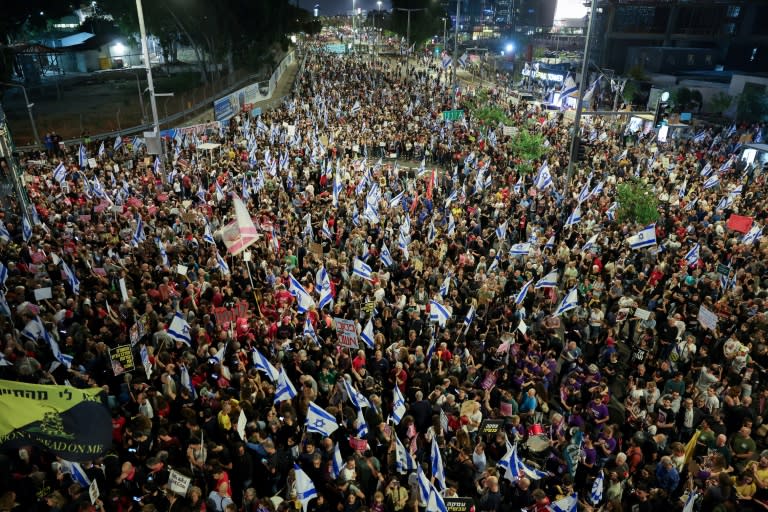Hamas, Israel entrench Gaza truce positions as latest Cairo talks end

- Oops!Something went wrong.Please try again later.
- Oops!Something went wrong.Please try again later.
A Hamas official said Sunday the group's delegation for Gaza truce talks in Cairo was leaving for Qatar, after public disagreement with Israel intensified over demands to end their seven-month war.
Earlier, at around the same time the Hamas delegation was meeting Qatari and Egyptian mediators according to a Hamas source, Israeli Prime Minister Benjamin Netanyahu said "surrendering" to a demand to end the war would amount to defeat.
The Qatar-based political chief of Hamas, Ismail Haniyeh, countered by accusing Netanyahu of sabotaging the talks.
The first Hamas official, who requested anonymity to discuss the negotiations, told AFP that "the meeting with the Egyptian intelligence minister has ended and the Hamas delegation is leaving for Doha for further consultations".
Netanyahu on Sunday also announced a government decision to close operations in Israel of Qatar-based news channel Al Jazeera, which has broadcast round-the-clock coverage of the conflict.
It went off-air a short time later.
The network condemned Israel's decision as a "criminal act", and said it would take legal action.
The Gaza war's impact has been increasingly felt around the world as pro-Palestinian university students follow the example of protest encampments in the United States.
Gaza's bloodiest-ever war began following Hamas's unprecedented October 7 attack on Israel that resulted in the deaths of more than 1,170 people, mostly civilians, according to an AFP tally of Israeli official figures.
Vowing to destroy Hamas, Israel's retaliatory offensive has killed at least 34,683 people in Gaza, mostly women and children, according to the Hamas-run territory's health ministry.
- 'Hopeless' -
An AFP correspondent and witnesses on Sunday reported shelling and gunfire in the Gaza City area, helicopter fire in central and southern Gaza, and a missile strike on a house in the Rafah area.
Israel's military said air strikes over the past day killed several militants including three in central Gaza who took part in the October attack.
"We want a ceasefire and for Gaza to return to how it was, or even better... We want a permanent ceasefire," said displaced woman Umm Jamil al-Ghussein in the southern city of Rafah, where about 1.2 million Gazans have sought shelter.
Arwa Saqr, displaced from Khan Yunis, said it seemed like every round of negotiations follows "the same scenario".
"We've become hopeless that the negotiations will succeed."
The Palestinian civilian toll has strained ties between Israel and its main military supplier and ally the United States.
Nonetheless, Washington's Secretary of State Antony Blinken said Friday that "the only thing standing between the people of Gaza and a ceasefire is Hamas".
Negotiators met in Cairo Sunday without an Israeli delegation present.
The mediators had proposed a 40-day pause in the fighting and an exchange of hostages for Palestinian prisoners, according to details released by Britain.
Any truce reached would be the first since a week-long November ceasefire saw a hostage-prisoner swap.
- Protests -
Qatari, Egyptian and US mediators met the Hamas delegation in Cairo on Saturday before talks resumed Sunday.
After "no developments" in the first round, a senior Hamas official insisted the group would "not agree under any circumstances" to a truce that did not explicitly include a complete end to the war, including Israel's withdrawal from Gaza.
Netanyahu, whose coalition includes ultra-nationalist parties, faces regular protests at home, including thousands in Tel Aviv on Saturday night demanding a deal to bring home hostages still held in Gaza.
According to a statement from Netanyahu's office, he told his cabinet Israel would not let Hamas "take control of Gaza again, rebuild their military infrastructure and return to threaten the citizens of Israel".
"Israel will not agree to Hamas's demands, which mean surrender, and will continue the fighting until all its goals are achieved," he added.
Haniyeh said Netanyahu wanted to "invent constant justifications for the continuation of aggression, expanding the circle of conflict, and sabotaging efforts made through various mediators and parties".
He said Hamas "remains eager to reach a comprehensive and interconnected agreement in stages, ending the aggression, ensuring withdrawal, and achieving a serious prisoner exchange deal".
Previous negotiation efforts had stalled in part because of Hamas's demand for a lasting ceasefire and Netanyahu's vows to crush its remaining fighters in Rafah.
- Aid crossing shut -
Netanyahu has vowed to invade Rafah regardless of any truce, and despite concerns from the United States, other countries and aid groups.
At the start of the war, Israeli Defence Minister Yoav Gallant said his country would impose a "complete siege" blocking food, water and other supplies.
Continuous appeals from aid groups, the United Nations and world leaders for greater access have, according to the UN, led to some improvements.
Israel in December reopened the southern Kerem Shalom border crossing for aid, but on Sunday the army said it had closed after being targeted from the area of the Rafah crossing to Egypt.
In their October attack on Israel the militants seized hostages, of whom 128 remain in Gaza, including 35 who the military says are dead.
On Sunday the Hostages and Missing Families Forum appealed to Netanyahu, telling him in a statement to "disregard all political pressure".
Some far-right members of the Israeli government have opposed the latest truce proposal and called for fighting to continue.
France's President Emmanuel Macron urged Netanyahu in a phone call Sunday to reach a deal in negotiations with Hamas, the French presidency said.
Gaza's war has led to unrest across the Middle East involving Iran-backed groups, particularly between Lebanon's Hezbollah movement and Israeli forces which have exchanged regular cross-border fire.
Hezbollah said Sunday it launched dozens of rockets at northern Israel in retaliation for a strike on south Lebanon that a local official and state media said killed several four people.
burs-srm/ami

